英语主题教研活动分享ppt课件
- 格式:ppt
- 大小:6.23 MB
- 文档页数:30

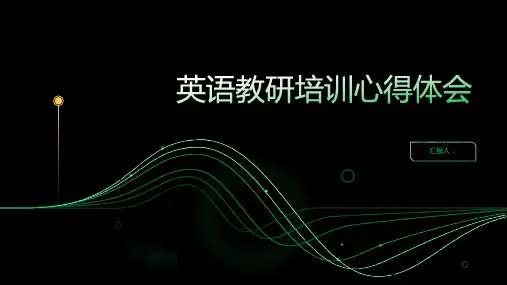
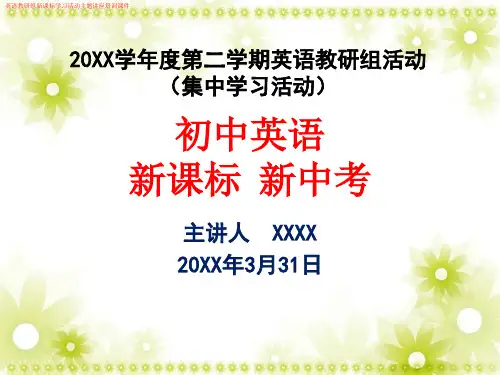

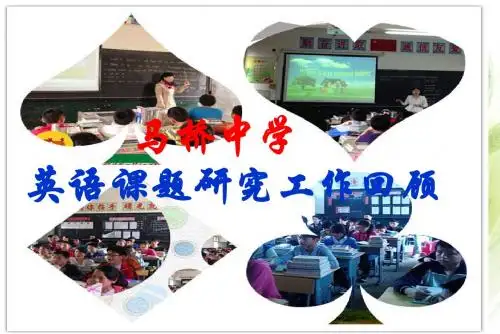


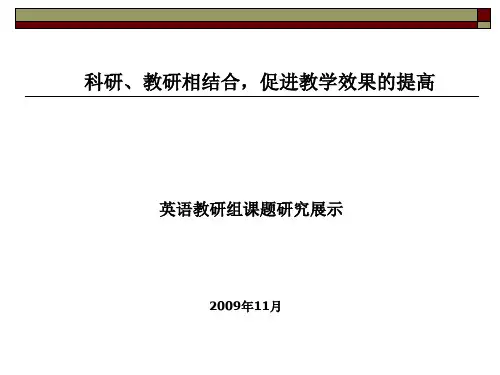

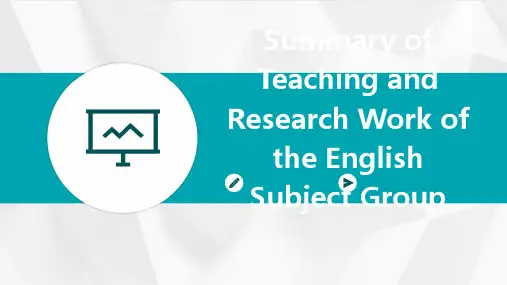

第1篇IntroductionThis English language teaching (ELT) research and development (R&D) activity aims to enhance the quality of English language instruction by fostering collaboration among teachers, sharing innovative teaching strategies, and exploring current trends in ELT. The activity will be conducted in a workshop format, allowing participants to engage in interactive sessions, practical activities, and reflective discussions.ObjectiveBy the end of this activity, participants will be able to:1. Understand the importance of collaborative research and development in ELT.2. Identify current trends and challenges in English language teaching.3. Develop and implement innovative teaching strategies.4. Reflect on their own teaching practices and plan for professional growth.Agenda1. Welcome and Introduction (10 minutes)- Brief overview of the workshop objectives and agenda.- Icebreaker activity: “Two Truths and a Lie” to get participants talking.2. Session 1: The Importance of Collaborative R&D in ELT (30 minutes)- Presentation on the benefits of collaborative research and development in ELT.- Case study: Analysis of a successful collaborative R&D project in a local school.- Group discussion: How can teachers contribute to collaborative R&D in their institutions?3. Session 2: Current Trends and Challenges in ELT (45 minutes)- Presentation on current trends in ELT, including technology integration, global English, and multilingualism.- Interactive activity: “Trend Matching”– Participants match current ELT trends with relevant challenges.- Group discussion: How can teachers adapt their teaching methods to address these challenges?4. Session 3: Developing Innovative Teaching Strategies (60 minutes)- Workshop activity: Participants work in groups to brainstorm and design innovative teaching strategies.- Sharing and feedback: Each group presents their strategy to therest of the participants, receiving constructive feedback.- Resource sharing: Collection of innovative teaching strategies in a shared document or digital platform.5. Session 4: Reflection and Professional Growth (30 minutes)- Individual reflection: Participants write a brief reflection on their learning from the workshop.- Group discussion: How can participants implement their new knowledge and skills in their teaching practices?- Action plan: Participants develop an individual action plan for professional growth based on the workshop content.6. Closing Remarks and Certificates (15 minutes)- Recap of the key takeaways from the workshop.- Distribution of certificates of participation.- Open forum for questions and comments.Materials- Projector and screen- Whiteboard and markers- Handouts with presentation slides and activity guidelines- Digital platform for resource sharing (e.g., Google Drive, Padlet)- Writing materials (pens, paper, etc.)Activities1. Icebreaker Activity: Two Truths and a Lie- Participants introduce themselves and share three statements about their teaching experiences. Two of the statements are true, and one is false. The group guesses which statement is the lie.2. Trend Matching- Participants are given a list of ELT trends and a list of challenges. They must match each trend with the relevant challenge.3. Workshop Activity: Developing Innovative Teaching Strategies- Groups are given a scenario or a specific teaching objective and must brainstorm and design a teaching strategy to achieve it.4. Individual Reflection- Participants write a short reflection on what they have learned, how they plan to apply it in their teaching, and any challenges they anticipate.Evaluation- Participants’ feedback on the workshop activities and resources.- Pre- and post-workshop surveys to assess the impact of the workshop on participants’ knowledge and skills.- Follow-up observations and interviews to track participants’ implementation of new strategies in their teaching practices.ConclusionThis English language teaching R&D activity is designed to provide teachers with the tools and knowledge they need to enhance their teaching practices and contribute to the continuous improvement of ELTin their institutions. By fostering collaboration, exploring current trends, and developing innovative strategies, teachers can create a more engaging and effective learning environment for their students.第2篇IntroductionWelcome to our English Language Teaching (ELT) Research and Development (R&D) activity. This session is designed to enhance our understanding of ELT practices, explore innovative teaching methods, and foster a collaborative environment among educators. Through a series of interactive workshops, discussions, and case studies, we aim to provide you with practical tools and insights to improve your teaching skills and student learning outcomes.ObjectiveBy the end of this activity, participants will be able to:1. Understand the key principles of effective ELT.2. Identify and analyze different teaching methodologies and their application in the classroom.3. Develop and implement strategies for engaging students in the learning process.4. Evaluate and reflect on their own teaching practices to enhance student learning.Agenda1. Welcome and Introduction (10 minutes)- Brief overview of the day's activities.- Introduction of facilitators and participants.2. Session 1: Theoretical Foundations of ELT (30 minutes)- Key concepts of second language acquisition (SLA).- Importance of cultural awareness in ELT.- The role of grammar, vocabulary, and pronunciation in language learning.3. Session 2: Teaching Methodologies (45 minutes)- Traditional vs. communicative approaches.- Task-based language learning (TBLT).- The use of technology in ELT.4. Interactive Workshop: Designing an Effective Lesson Plan (60 minutes)- Participants will work in groups to design a lesson plan based on a given theme or topic.- Emphasis on incorporating various teaching methodologies and activities.5. Case Study Analysis (30 minutes)- Presentation of a case study highlighting a successful ELT initiative.- Group discussion on the strategies employed and their effectiveness.6. Session 3: Student Engagement and Motivation (45 minutes)- Techniques for fostering student engagement.- Strategies for managing student motivation.- The role of feedback and assessment in student learning.7. Interactive Workshop: Role Play (60 minutes)- Participants will engage in a role-play activity to practice communication skills and address common challenges faced by teachers.8. Session 4: Reflective Practice and Professional Development (30 minutes)- Importance of reflective practice in ELT.- Strategies for ongoing professional development.- Resources and tools for teachers.9. Closing Remarks and Feedback (10 minutes)- Summary of key takeaways.- Collection of participant feedback to improve future activities.Session 1: Theoretical Foundations of ELTSlide 1: Welcome to Session 1Good morning/afternoon, everyone. Today, we will delve into the theoretical foundations of English Language Teaching (ELT). Understanding these principles will help us develop a strong foundation for our teaching practices.Slide 2: Key Concepts of Second Language Acquisition (SLA)- Acquisition vs. Learning: Language acquisition is an unconscious process, while learning involves conscious effort.- The Input Hypothesis: Learners acquire language by understanding input that is slightly above their current level of proficiency.- The Interaction Hypothesis: Interaction plays a crucial role in language learning, as it provides opportunities for feedback and correction.Slide 3: Importance of Cultural Awareness- Cultural awareness is essential for effective communication and teaching.- Understanding the cultural background of students can help us tailor our teaching methods to their needs.- We will explore cultural differences in communication styles, norms, and values.Slide 4: The Role of Grammar, Vocabulary, and Pronunciation- Grammar provides the structure for language.- Vocabulary is the building block of communication.- Pronunciation affects comprehensibility and confidence.Session 2: Teaching MethodologiesSlide 5: Traditional vs. Communicative Approaches- Traditional Approach: Focuses on grammar and vocabulary, with limited interaction.- Communicative Approach: Emphasizes communication skills, encouraging students to use the language in real-life situations.Slide 6: Task-Based Language Learning (TBLT)- TBLT involves students completing tasks that require them to use the language in a meaningful context.- Tasks are designed to be engaging, relevant, and communicative.Slide 7: The Use of Technology in ELT- Technology can enhance language learning through various tools and resources.- We will explore different technologies, such as interactive whiteboards, online platforms, and mobile apps.Interactive Workshop: Designing an Effective Lesson PlanSlide 8: Workshop OverviewIn this workshop, you will work in groups to design an effective lesson plan based on a given theme or topic. Your lesson plan should incorporate various teaching methodologies and activities.Slide 9: Group Instructions- Divide into groups of 3-4 participants.- Choose a theme or topic for your lesson plan.- Plan a lesson that incorporates different teaching methodologies and activities.- Consider the following aspects:- Introduction- Main activities- Assessment- FeedbackCase Study AnalysisSlide 10: Case Study OverviewWe will now present a case study highlighting a successful ELT initiative. Your task is to analyze the strategies employed and discuss their effectiveness.Slide 11: Case Study Details- Briefly describe the context of the case study.- Identify the teaching methodologies and strategies used.- Analyze the effectiveness of these strategies in achieving the desired learning outcomes.Session 3: Student Engagement and MotivationSlide 12: Techniques for Fostering Student Engagement- Use of real-life examples and authentic materials.- Incorporating varied activities and resources.- Encouraging student participation and collaboration.Slide 13: Strategies for Managing Student Motivation- Setting clear learning objectives and expectations.- Providing positive feedback and recognition.- Creating a supportive and inclusive learning environment.Slide 14: The Role of Feedback and Assessment in Student Learning- Feedback is crucial for guiding student learning and improving performance.- Assessment should be formative, ongoing, and student-centered.Interactive Workshop: Role PlaySlide 15: Workshop OverviewIn this role-play activity, you will practice communication skills and address common challenges faced by teachers. Your task is to:- Identify a challenge faced by a teacher.- Develop a strategy to address the challenge.- Present your strategy to the group.Session 4: Reflective Practice and Professional DevelopmentSlide 16: Importance of Reflective PracticeReflective practice involves analyzing and evaluating our teaching practices to improve student learning outcomes.Slide 17: Strategies for Ongoing Professional Development- Attend workshops, seminars, and conferences.- Join professional organizations and online communities.- Read research articles and educational resources.Slide 18: Resources and Tools for Teachers- Online platforms and apps for language learning.- Educational resources and materials.- Professional development opportunities.Closing Remarks and FeedbackSlide 19: Summary of Key Takeaways- Understanding the theoretical foundations of ELT is crucial for effective teaching.- Incorporating various teaching methodologies and activities can enhance student learning.- Reflective practice and ongoing professional development are essential for growth and improvement.Slide 20: FeedbackPlease take a few minutes to complete the feedback form provided. Your input will help us improve future activities.Thank you for participating in this English Language Teaching Research and Development activity. We hope you found it informative and engaging. Please feel free to share your thoughts and experiences with us.End of Presentation第3篇Objective:To enhance the quality of English language teaching through the exploration of innovative teaching methods, research findings, and collaborative learning among educators.Duration:1 Day (8:00 AM - 5:00 PM)Target Audience:English language teachers, educators, and researchers interested in improving their teaching practices and contributing to the field of English language education.Agenda:Session 1: Welcome and Introduction (8:00 AM - 8:30 AM)- Brief introduction to the workshop objectives and agenda.- Icebreaker activity to encourage networking and interaction among participants.Session 2: The State of English Language Teaching (8:30 AM - 9:30 AM)- Presentation on current trends and challenges in English language teaching.- Discussion on the impact of technology, globalization, and cultural diversity on language learning.Session 3: Research-Based Teaching Strategies (9:30 AM - 10:30 AM)- Overview of recent research in English language teaching.- Presentation of effective teaching strategies that have been proven to enhance student learning.- Interactive activity: Participants will brainstorm and share their own successful teaching strategies.Session 4: Technology in English Language Teaching (10:30 AM - 11:30 AM)- Introduction to various technological tools and resources that can be used in the classroom.- Demonstration of digital platforms and apps for language learning.- Small group activity: Participants will create a lesson plan incorporating technology.Session 5: Collaborative Learning and Peer Feedback (11:30 AM - 12:30 PM)- Discussion on the benefits of collaborative learning in language education.- Workshop on peer feedback techniques for professional development.- Pair activity: Participants will provide feedback on each other's lesson plans.Lunch Break (12:30 PM - 1:30 PM)Session 6: Classroom Management and Student Engagement (1:30 PM - 2:30 PM)- Strategies for effective classroom management.- Techniques to engage students in the learning process.- Role-play activity: Participants will practice classroom management scenarios.Session 7: Assessment and Evaluation in English Language Teaching (2:30 PM - 3:30 PM)- Overview of different types of assessments in language education.- Discussion on the importance of formative and summative assessment.- Small group activity: Participants will design a comprehensive assessment plan for a course.Session 8: Reflection and Sharing (3:30 PM - 4:30 PM)- Reflection on the day's activities and personal takeaways.- Sharing of best practices and innovative ideas.- Group activity: Participants will create a poster showcasing their favorite teaching strategies and resources.Session 9: Closing Remarks and Certificates (4:30 PM - 5:00 PM)- Summary of the workshop highlights.- Distribution of certificates of participation.- Open forum for questions and final thoughts.Handouts:- Workshop agenda and schedule.- List of recommended resources and technologies.- Templates for lesson plans and assessment tools.Evaluation:- Participants will complete a feedback form at the end of the workshop to assess the effectiveness of the activities and content.- Follow-up surveys may be sent out after the workshop to gather long-term feedback and track participant progress.Note:This agenda is a sample framework for an English language teaching research and development workshop. Adjustments can be made based on the specific needs and interests of the participants and the available time.。